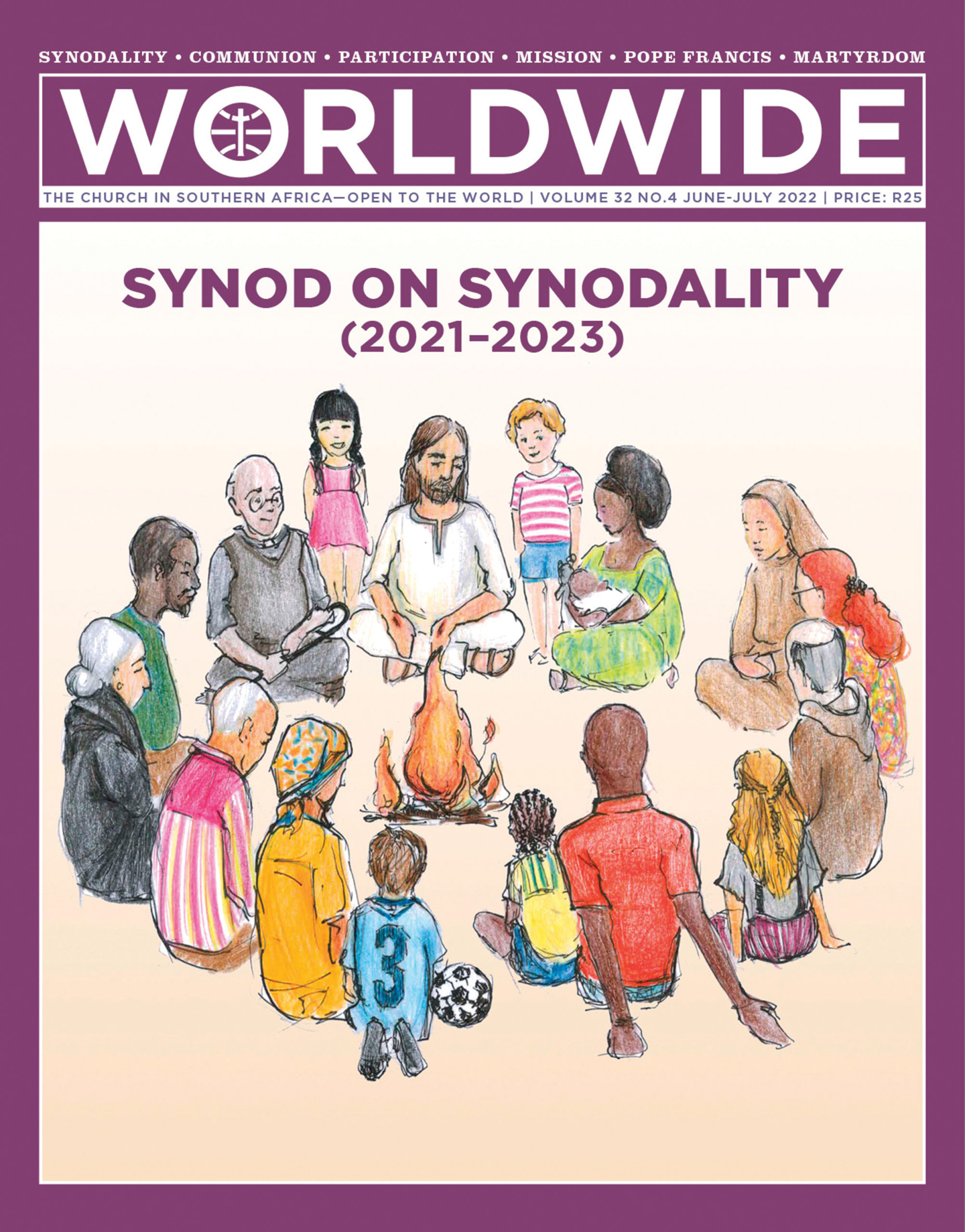
SYNOD ON SYNODALITY (2021–2023)
The cover illustration represents the exercise in which the Church is invited to engage in this process of synodality. Gathered by the Lord and guided by the Holy Spirit, through a journey of prayer, the people of God from all continents, representing diverse ages and kinds of lives, come together to listen to each other, including those marginalized, participating and reflecting on how to be transformed into an inclusive community sent to the mission in the world.
FOCUS • SECOND SYNOD OF ARCHDIOCESE OF PRETORIA
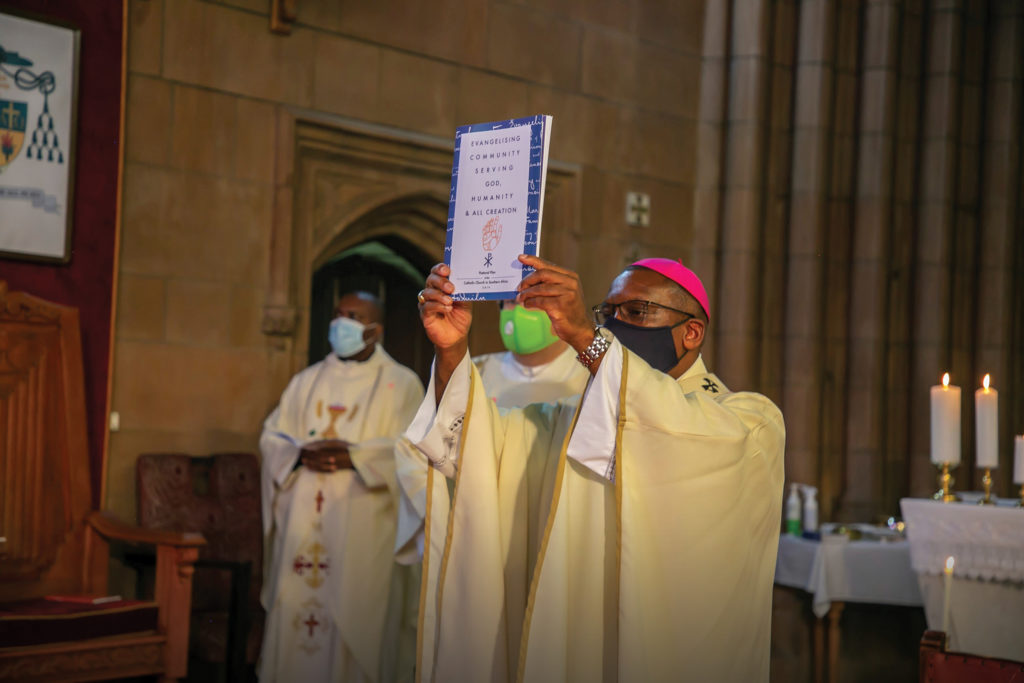
Pretoria Unfolds Her Vision As Church
The Archdiocese of Pretoria has made an exercise of listening and discernment, calling for a Second Synod and inviting her faithful to reflect upon their ecclesial realities
BY Fr Patrick Rakeketsi CSS | Director of the Synod, Archdiocese of Pretoria
THE SECOND Synod of the Archdiocese of Pretoria was launched by His Grace, Archbishop Dabula Mpako on the 28th February 2021 at the Sacred Heart Cathedral in Pretoria. It is based upon the New Pastoral Plan of the Southern African Catholic Bishops’ Conference (SACBC), the theme being Evangelising community, serving God, humanity and all Creation.
This Synod is aimed at applying locally the SACBC Pastoral Plan for the Archdiocese of Pretoria. At its launch, the Archbishop commissioned the Steering Committee to assist him in facilitating and co-ordinating the process. He also mandated the Deans of the Six Deaneries of the Archdiocese to oversee, monitor and ensure that the Synod achieves its purpose in all the parishes.
Synod logo
The logo symbolises the flame of the Holy Spirit given to the community gathered around the Lord. The Archdiocese, listening to the Spirit, intends to empower its faithful to be a true evangelising community, serving God, humanity and all Creation.
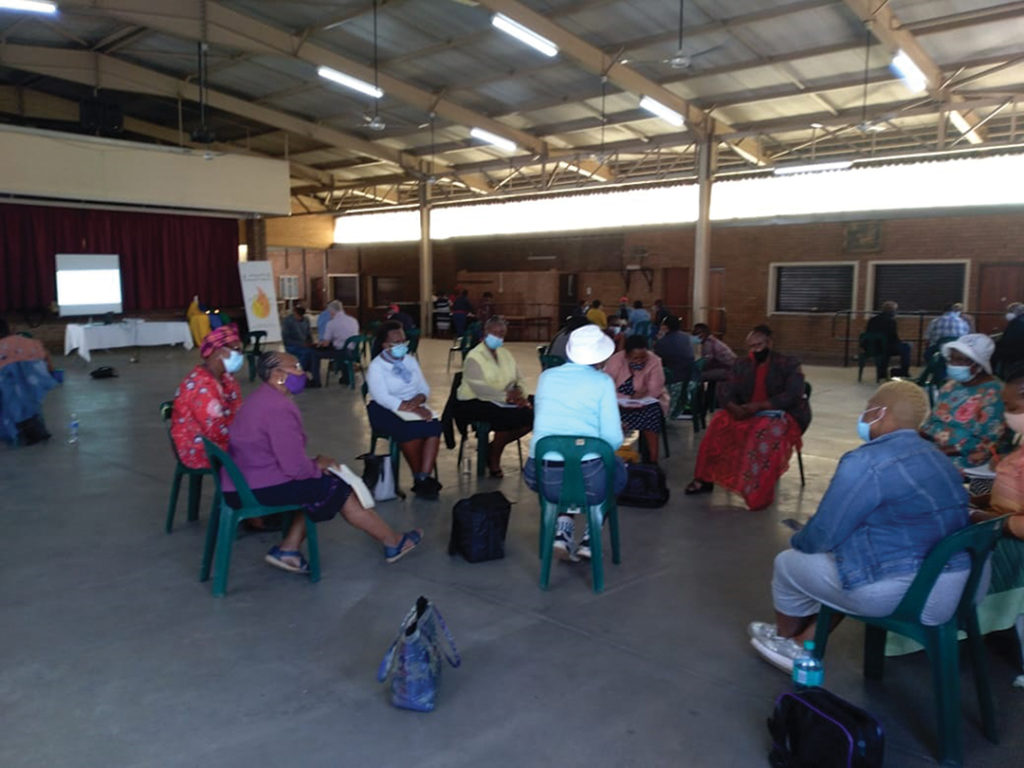
Synod workshops
In November 2020, during the preparatory phase, many foundational workshops were conducted for the clergy, religious and the Archdiocesan Pastoral Council. The Synod received a welcoming response.
In March 2021, Sodalities were invited to workshops in which they were able to respond to some questions regarding their reality. Each Sodality selected a group of facilitators in their respective deaneries to form the co-ordinating teams. These teams facilitated workshops for the rest of their members in the parishes.
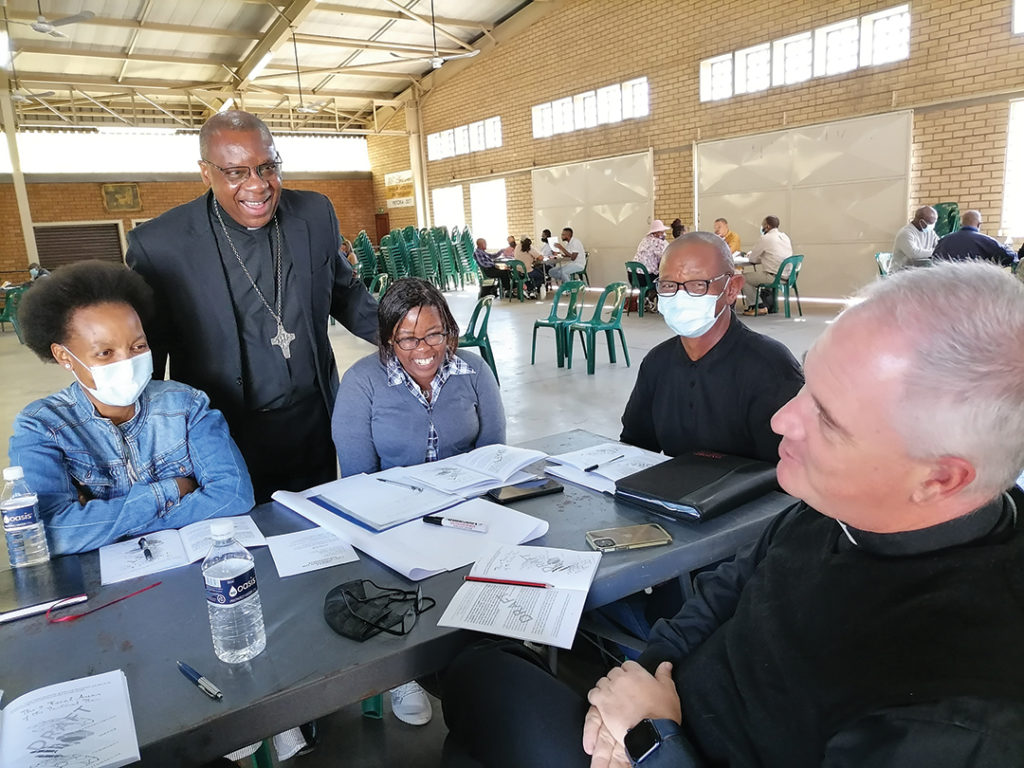
Synod parish facilitators
In March 2021, workshops were conducted by the Synod parish facilitators—co-ordinating teams in the parishes who helped the parish priests to run the Synod in their respective parishes. The workshops led to a better understanding of the vision of the new SACBC Pastoral Plan and the purpose of having the Second Synod of the Archdiocese.
Procedure of the Synod at the parish/pastoral districts
opted into the facilitators’ team. A good number of the faithful attended the workshops in the deaneries (see table on the right). Facilitators met with their respective parish priests and PPC members, to share on the feedback of the workshops and to plan the work ahead at parish and pastoral district levels. Each district had to consider its own situation and context. Facilitators were introduced formally by the parish priest and their role was explained to the parishioners. Various methods for meetings were adopted according to the structure of each parish; i.e. either Small Christian Communities (SCCs) or family groups. All meetings followed COVID-19 protocols. When meetings at homes were impossible, SCCs met at the parish on Sundays. Many parishes and districts used the social media platforms (facebook, whatsapp etc) to communicate the Synod questions.
The facilitators and the parish priests collated all the responses from the parishioners and summarised them. The Synod Steering Committee was tasked with co-ordinating all the summaries and drafting the Pastoral Plan.
Focal areas of the Synod
Nine focal areas were determined from the Pastoral Plan (see table on the right). The Synod helped the faithful to understand that the parish is at the centre of the Pastoral Plan. “The parish is the presence of the Church in a given territory, an environment for hearing God’s Word, for growth in the Christian life, for dialogue, proclamation, charitable outreach, worship and celebration. In all its activities the parish encourages and trains its members to be evangelisers. It is a community of communities, a sanctuary where the thirsty come to drink in the midst of their journey, and a centre of constant missionary outreach.” (Evangelii Gaudium #28).
Evangelisation
Through the Synod process, many of the faithful understood that their encounter with the Lord is generally facilitated by their participation in the celebration of the Sacraments, sharing of the Word of God, other liturgical activities and personal and communal prayers. The faithful must be given opportunities to cultivate a personal relationship with God, to learn how to pray and discern spiritual matters at a deeper level and to witness their own faith, so as to become a truly evangelising community.
Laity formation and empowerment
The Synod brought to the fore the important role of the laity. Empowered by virtue of their baptism, they participate in the pastoral work of the Church with a sense of belonging and ownership. Laity “are in their own way made sharers in the priestly, prophetical, and kingly functions of Christ; and they carry out for their own part the mission of the whole Christian people in the Church and in the world” (Lumen Gentium #31). Their role and leadership need to be recognised and valued. The Synod brought to the fore the important role of the laity. Empowered by virtue of their baptism, they participate in the pastoral work of the Church with a sense of belonging and ownership. Laity “are in their own way made sharers in the priestly, prophetical, and kingly functions of Christ; and they carry out for their own part the mission of the whole Christian people in the Church and in the world” (Lumen Gentium #31). Their role and leadership need to be recognised and valued.
They are called to listen to God, to be led by the Holy Spirit and actively participate in the various activities of the Church. Each parishioner is encouraged to take up roles in the various ministries and to participate in the decision-making and leadership positions in the parish.
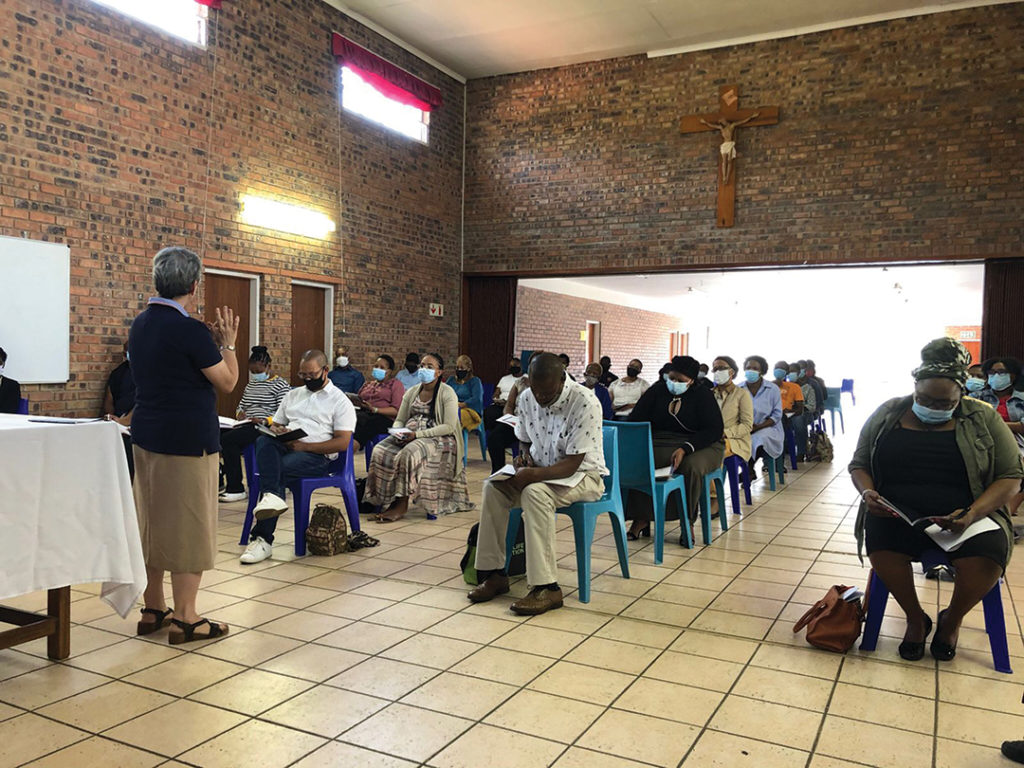
Credit: Deacon Callum Scott.
Life and ministry of the clergy and religious
The faithful reflected on the life and ministry of the clergy and religious during the Synod. Priests serve the Church by administering the Sacraments, teaching the faith and engaging in the spiritual, human, and social welfare of the people. Deacons serve in the ministries of the Word of God, altar and charity and in other ministries entrusted to them by the archbishop.
Religious are also committed to charitable and social justice activities according to their various charisms. Some are active in the pastoral ministry, while others are engaged in community projects outside the parishes.
Marriage and family life
Marriage and family life stand at the centre of Christian life. The Synod reflected at length on both. The Sacrament of Marriage is a covenant of love between a man and a woman for their whole life and, by its nature, it is ordered towards the good of the spouses, procreation and the education of their children.
The Synod reminded the faithful of each one’s responsibility to work for healing and reconciliation
The vocation to Sacramental Marriage is promoted and encouraged in the parishes mainly through homilies, wedding days, anniversaries, and any other special occasions dedicated to marriage and family. They both form part of the catechetical contents given to children and youth, especially during Confirmation preparation and the RCIA (Right for Christian Initiation of Adults) classes.
Married couples are involved in promoting the Sacrament through various programmes and events. The faithful respond positively to them. Some Sodalities also play an important role in promoting marriage and family life by teaching and encouraging the youth. Permanent deacons promote them by virtue of being married. Religious sisters also help the youth to know about married life.
Youth
The Synod also focused on the crucial role that the youth play in the Church. “Youth is a time when genuine and irrepressible questions arise about the meaning of life and the direction our own lives should take. [Therefore, they] need witnesses and teachers who can walk with them, teaching them to love the Gospel and to share it, especially with their peers, and thus to become authentic and credible messengers”
(Africae Munus #61).
Youth realise that they can evangelise. They are active in the life of the parish as altar servers, members of the choir and of youth movements and groups. They participate in liturgical, spiritual and formation programmes, attend catechesis and are involved in social outreach and charity projects.
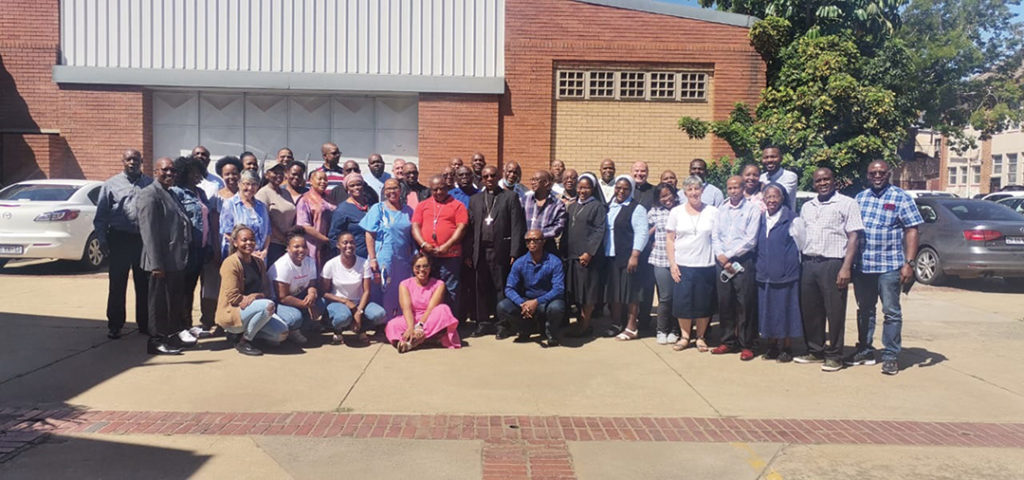
Justice, peace and non-violence
The Synod dealt with the social action of the Church, focusing mainly on justice, peace and non-violence. Parishioners pray for justice, peace and non-violence, promote unity and strive for forgiveness and reconciliation when differences arise. They promote social cohesion by listening and supporting one another.
“Justice is a virtue which guides the human will, prompting us to give others what is due to them by reason of their existence and their actions. Likewise, peace is not the mere absence of war, or the result of man’s actions to avoid conflict; it is, above all, a gift of God which must be implored with faith, and which has the way to its fulfilment in Jesus” (Pope Benedict XVI, Private Audience, 13 January 2012).
Healing and reconciliation
Due to its past history of oppression and apartheid, South Africa is a country always in need of healing and reconciliation. The Synod reminded the faithful of each one’s responsibility to work for healing and reconciliation.
Healing is a process towards recovery at physical, psychological, emotional, and spiritual level. It starts by acknowledging personal wounds at various levels and allowing the light of God to shine on those wounds. Through this process the person reaches a state of wellbeing and is made whole again.
The Synod reflected on various ways that the local Church can take care of Creation
Reconciliation is the coming together of aggrieved parties in mutual understanding, pardoning each other. It culminates in the restoration of peace, rebuilding the relationship with God and with others. Both healing and reconciliation involve elements of faith and prayer and openness to the action of the Holy Spirit.
Care of Creation and the environment
Following the call of Pope Francis, in Laudato Si’, on the care of Creation and the environment, the Synod reflected on various ways that the local Church can take care of Creation. Pope Francis, in Laudato Si’ has highlighted the awareness that everything is inter-connected and he has helped us to appreciate nature more and to see God in Creation and every individual as part of nature. Humans are uniquely created and called to exercise responsible stewardship on behalf of the loving Creator.
Parishes generally promote the care of Creation by maintaining in good condition the churchyard. Some have flowers and vegetable gardens, plant trees, save water and electricity, while some do recycling activities. Some parishes conduct workshops on the care of Creation and the environment.
Sustainability
The Synod also focused on the sustainability of the local church, as self-supportive, self-reliant, self-ministering, self-propagating and financially independent. A sustainable Church invests in her spiritual, pastoral and economical dimensions to ensure her growth, using available resources, initiatives and pastoral programmes to meet the needs of the parish and the Archdiocese.
The parishes sustain themselves through participation and involvement of the laity in pastoral ministries such as Extraordinary Ministry of Holy Communion, Proclaimers of the Word, Choristers and Funeral Ministers. They are also active in Sodalities, groups/movements and in formation programmes as catechists. Some serve as leaders in Parish Pastoral Councils and Parish Finance Committees.
| Dates To Remember |
|
June 1 – Global Day of Parents 4 – International Day of Innocent Children Victims of Aggression 5 – Pentecost Sunday 5 – World Environment Day 8 – World Oceans Day 12 – World Day Against Child Labour 13 – International Albinism Awareness Day 15 – World Elder Abuse Awareness Day 16 – National Youth Day in South Africa 17 – World Day to Combat Desertification and Drought 19 – International Day for the Elimination of Sexual Violence in Conflict 20 – World Refugee Day 23 – International Widows’ Day 26 – International Day against Drug Abuse and Illicit Trafficking 27 – Micro, Small and Medium-sized Enterprises Day July 3 – International Day of Cooperatives 11 – World Population Day 15 – World Youth Skills Day 18 – Nelson Mandela International Day 24 – World Day of Prayer for Grandparents and the Elderly 30 – International Day of Friendship 30 – World Day against Trafficking in Persons |

Hiya, I’m really glad I have found this info. Today bloggers publish just about gossips and net and this is actually irritating. A good site with interesting content, this is what I need. Thanks for keeping this web site, I will be visiting it. Do you do newsletters? Can not find it.